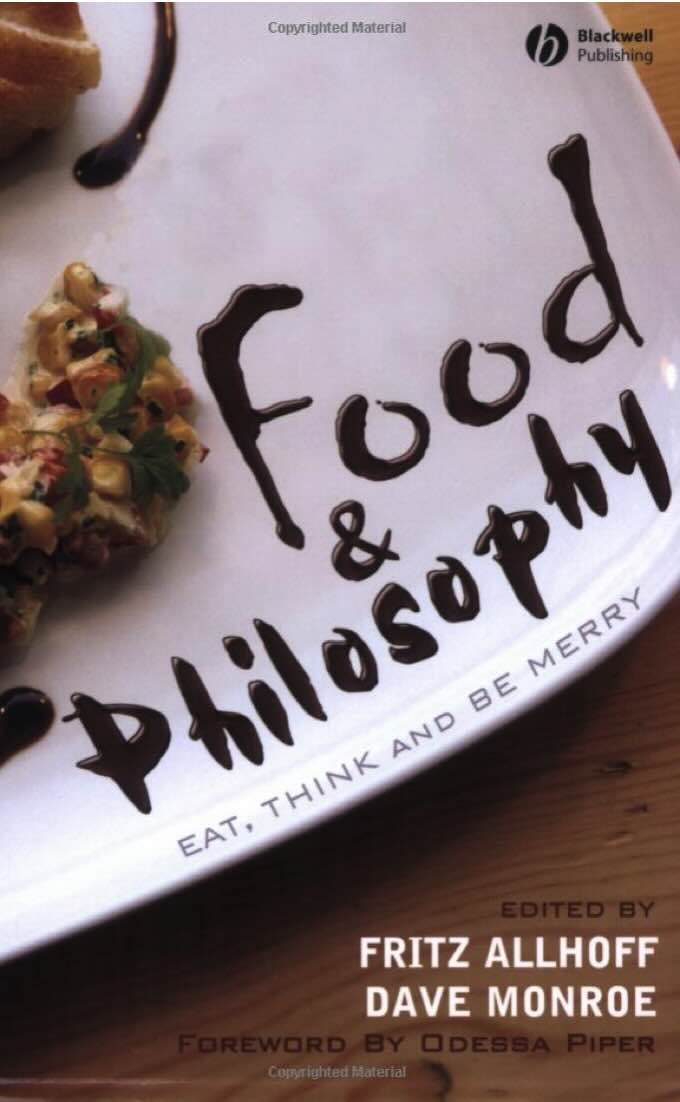Fritz Allhoff and Dave Monroe(ed):
Food & Philosophy
Eat, Think, and Be Merry

Plato(429?–347 B.C.E.):
Republic
Trans. G. M. A. Grube.
Socrates: True enough. I was forgetting that they'll obviously need salt, olives, cheese, boiled roots, and vegetables of the sort they cook in the country. We'll give them desserts, too, of course, consisting of figs, chickpeas, and beans, and they'll roast myrtle and acorns before the fire, drinking moderately. And so they'll live in peace and good health, and when they die at a ripe old age, they'll bequeath a similar life to their children.
Glaucon: If you were founding a city for pigs, Socrates, wouldn't you fatten them on the same diet?
Fritz Allhoff and Dave Monroe:
An Introduction to Food & Philosophy
Socrates and Glaucon do not discuss diets with an eye toward establishing conditions for ideal culinary habits. Rather, the context in which this argument occurs is an investigation of justice. This seems clearly to be a case in which food is important only as an aspect of some larger issue. While this is not universally true of all food-oriented philosophical discussion (one thinks of notable exceptions like Brillat-Savarin), it seems to be the dominant historical attitude. Recently, however, there has been an increasing number of attempts to throw philosophical light on this underappreciated, if ubiquitous, aspect of human life. This anthology is a continuation of this movement; we support the thesis that food is, and ought to be, a proper object of philosophical reflection in its own right.
One might say, then, that this anthology, and the movement within which it is situated, starts from a suggestion drawn out of Glaucon’s protest to Socrates. Human beings eat for more than mere sustenance; we are also reflective creatures with an apparently unique capacity for taste. To give food a just, properly nuanced, philosophical treatment requires sustained investigation: we are, as Glaucon indirectly observes, more than mere pigs, so discussion of our diets calls for more sophistication. Because we are reflective, we ought to think about what ramifications our diets may have for other people, animals, or the world at large. Perhaps we should ponder our capacity for gustatory delight, and attempt to pin down what qualities make food good, in addition to nutritive.
The faculty of taste, and its associate objects, might raise interesting questions for theories of perception and certain views of the mind. One may also wonder about the extent to which cultures determine food preferences, and so on.
Epicurus(伊壁鳩魯 341–270 B.C.E.) :
Letters, Principal Doctrines, Vatican Sayings, and Fragments
Eugene M. O'Connor
"The beginning and root of all good is the pleasure of the stomach; even wisdom and culture must be referred to this."
"Not that eating is fun, but that the beginning and root of all good is not to be hungry and not to be thirsty."
"Frugality節儉 too has a limit, and the man who disregards it is in like case with him who errs through excess."
"We think highly of frugality not that we may always keep to a cheap and simple diet, but that we may be free from desire regarding it."
"Most men fear frugality and through their fear are led to actions most likely to produce fear."
"Those have the sweetest pleasure in luxury who least need it."
"We have need of pleasure when we suffer pain because of pleasure's absence. But when we are not suffering this pain, although in a state of sensation, there is no need for pleasure. For it is not natural pleasure that sets wrongdoing into action, but rather the striving after idle fancies."
"Of all the things which wisdom acquires to produce the blessedness of the complete life, far the greatest is the possession of friendship."
"You must reflect carefully beforehand with whom you are to eat and drink, rather than what you are to eat and drink. For a dinner of meats without the company of a friend is like the life of a lion or a wolf. "
